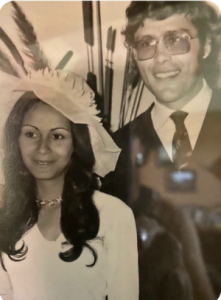From former President Trump’s accusations of Haitian immigrants eating the pets of other residents of Ohio and Vice President Kamala Harris’ plans to close private immigration detention centers and limit deportations, the election season has stirred passionate debates surrounding immigration policy.
Immigration stories within the community offer insight. From navigating language barriers and discrimination while preserving culture, these lived experiences highlight the challenges and aspirations that lead to students’ perspectives on the topic.
The current state of immigration in U.S. politics is sharply divided. Immigration dominated every night of the 2024 National Republican Convention and was a major point of contention at the First Presidential debate on June 27, 2024.
The Republican party, influenced by former President Trump’s policies, often prioritizes border security and strict enforcement measures for national security. According to the Peterson Institute for International Economics, if elected, Trump has proposed the largest domestic deportation operation in American history, intending to deport approximately 11 million migrants deemed ineligible for citizenship by the United States in a multi-year military program and other restrictive acts on immigration including ending soil birthright citizenship unless at least one parent is a US citizen.

According to the White House Website, Vice President Harris plans to lead the implementation of the Root Causes Strategy, addressing the root causes of migration from Central America, focusing on issues like poverty, violence and corruption. Harris has supported working with non-governmental associations to provide resources and assistance to immigrants and advocates for strengthening the asylum process.
The current immigration policy under the Biden administration supports a pathway to citizenship for undocumented immigrants, particularly those who came to the U.S. as children (DREAMers and DACA) and those with Temporary Protected Status. Under the Biden administration, the Department of Homeland Security implemented Keeping Families Together, a process aimed at allowing non-citizen spouses and non-citizen step-children of U.S. citizens to request parole in place under existing statutory authority.
Sophomore Aldegundo Brenneman is a Mexican and Brazilian-American. Originally from Mexico, his grandfather joined the U.S. Peace Corps, leading him to Brazil, where he met Brenneman’s grandmother.
“My grandpa initially moved to Chicago for work and joined his cousin who was already here,” Brenneman said.

His grandfather faced challenges such as learning English and integrating with native speakers. Eventually, he moved to Wisconsin to reunite with the rest of his family.
Following her husband, Brenneman’s grandmother joined him in Madison, Wisconsin. “It was a pretty sad experience for my grandma, leaving her family,” Brenneman said. Financial constraints prevented her from returning to Brazil, severing ties with her family. “One of her grandmothers didn’t really want her to move, and she was really close with her before she left,” he said.
His grandfather’s journey included many manual labor jobs before securing a position at a foundry casting metal. “Immigrant workers are more likely to start a business and do manual labor than people who are living here already … immigration drives the economy too,” Brenneman said, “so they are definitely benefiting the country in many ways.”
Senior Serene Kalugdan is half Hmong and Filipino. Her Hmong mother was young in the 1970s post-Vietnam era when the U.S. recruited Hmong people to combat the Laotian government and the spread of communism. It was unsuccessful and displaced many Hmong. In response to the Hmong’s’ betrayal, the Laotian government began to implement laws of executing Hmong people. Kalugdan’s maternal grandfather was one of the many Hmong men recruited, fleeing to Thailand to escape. “[My grandfather] was very smart, so he could speak English and he filled out all the refugee papers and got sponsored from the camps in Thailand to come to the United States,” Kalugdan said.
Kalugdan’s father, who is Filipino, moved to the U.S. during Ferdinand Marcos’s rule due to political unrest. “Because of Marcos, my grandparents thought they should move because of the instability,” Kalugdan said.
Her grandparents were prominent in their society; her grandfather was a shaman and healer. “They were always upset that they had to come here because they were in their 50s, they had all this prominence in their society but when you come here none of that matters,” Kalugdan said.
Her mom faced discrimination when coming to the U.S.
“My mom told me she remembers people chasing her … and having to sacrifice meals for her siblings,” Kalugdan said. Her father faced similar discrimination upon arrival in the U.S., also struggling with education since he did not speak English.
“I think right now people fear what they don’t know, [and] because of that people have antagonized immigration because they don’t really know what is going on,” Kalugdan said. “I know Trump has used immigration in a negative format with crime to scare the Republican party.”
Reflecting on current media outlets, “I feel like our country makes it into a problem when we’re talking about [immigration]. It can be really useful for a country. It drives the economy, but people are playing into the downsides,” Brenneman said.
Brenneman’s and Kalugdan’s immigration stories show the personal challenges and aspirations shared by many within immigration communities. The portrayal in media outlets can often express Democratic or Republican parties’ policies to implement in a light that dehumanizes immigration. As the election season unfolds, such narratives serve as a reminder